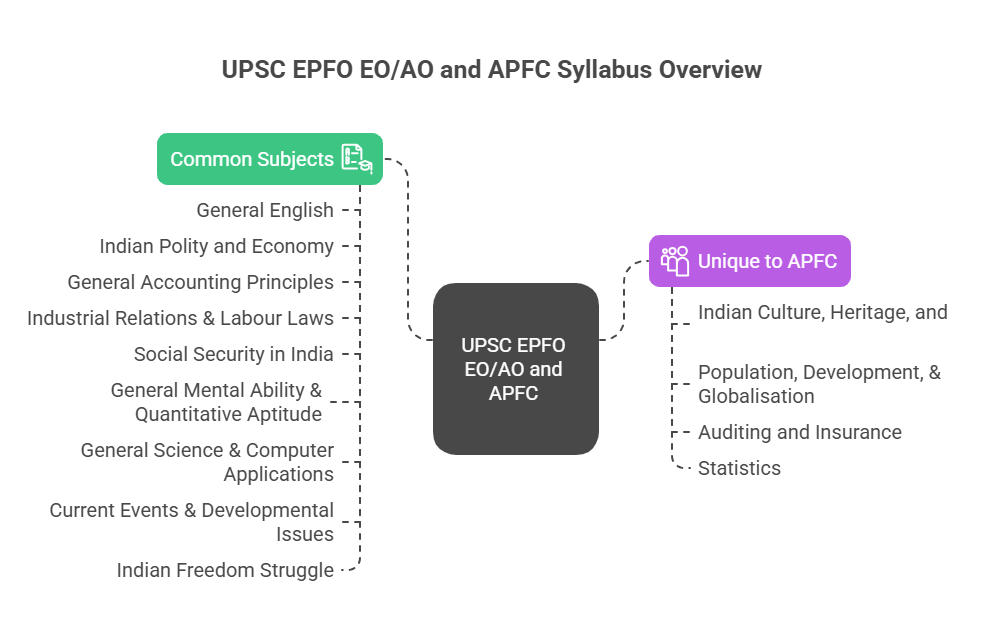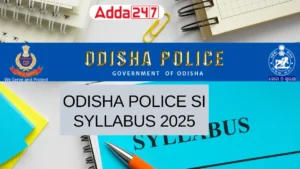The Union Public Service Commission conducts the EPFO exam to recruit for Enforcement Officer/Accounts Officer (EO/AO) and Assistant Provident Fund Commissioner (APFC) positions. The 2025 selection process comprises a two-stage Recruitment Test (RT) and an interview, carrying a total of 400 marks (300 for the written and 100 for the personality test); the written exam alone contributes 75% and penalizes incorrect answers by one‑third mark. Through this article, all candidates can understand the full UPSC EPFO syllabus 2025 along with the exam pattern.
UPSC EPFO Syllabus 2025 and Exam Pattern
In the UPSC EPFO 2025 exam, the selection process has two stages, namely the first is a written test called the Recruitment Test (RT), and the second is an Interview. The written test is objective (multiple-choice questions) and includes topics like Indian Polity, Economy, Labour Laws, and General Accounting. Candidates who pass this test are called for an Interview based on their personality. Read this article to get full details about the UPSC EPFO Syllabus 2025
, new exam pattern, interview process, and how to prepare for the exam.
UPSC EPFO Syllabus 2025 (Subject-wise)
Before starting their preparation, candidates must know that it is important to understand the subjects covered in the UPSC EPFO exam. This exam checks conceptual understanding, awareness about governance and economy, and general intelligence. Here is the detailed subject-wise UPSC EPFO syllabus 2025:
1. General English
-
- Vocabulary (Synonyms, Antonyms)
- Grammar (Tenses, Prepositions, Active-Passive, Direct-Indirect speech)
- Comprehension Passages
- Spotting Errors
- Fill in the blanks
- Sentence Improvement and Rearrangement
2. Indian Freedom Struggle
-
- Early resistance movements (1857 Revolt)
- Role of INC and moderates-extremists
- Gandhian movements (Non-Cooperation, Civil Disobedience, Quit India)
- Important leaders: Gandhi, Nehru, Subhas Chandra Bose, Bhagat Singh, etc.
- British policies and their impact on Indian society
3. Current Events and Developmental Issues
-
- Government schemes and programs
- National and global summits
- Reports by international organizations (UN, IMF, World Bank)
- India’s international relations
- Major socio-economic initiatives
- Climate change, health, education, and development issues
4. Indian Polity and Economy
-
- Constitution of India: Preamble, Fundamental Rights, DPSPs, Amendments
- Parliament, President, Prime Minister, Judiciary
- Federalism, Panchayati Raj, Election Commission
- Economic Planning, Budget, Banking System
- Inflation, GDP, Fiscal Deficit
- Policies related to trade, industry, and labor
5. General Accounting Principles
-
- Double-entry system
- Journal entries, Ledger, Trial Balance
- Depreciation, Cash Book, Bank Reconciliation
- Basic financial statements: Profit & Loss, Balance Sheet
- Principles of Accounting Standards (briefly)
6. Industrial Relations and Labour Laws
-
- History and evolution of labor laws in India
- Trade Unions Act, Industrial Disputes Act, Factories Act
- Wage Code, Social Security Code, Occupational Safety Code
- Recent labour reforms and their implications
- EPFO-related Acts and compliance norms
7. General Mental Ability and Quantitative Aptitude
-
- Number Series, Coding-Decoding, Blood Relations
- Puzzles, Seating Arrangement, Directions
- Arithmetic: Percentages, Profit & Loss, Time & Work, SI & CI
- Data Interpretation: Tables, Bar Graphs, Pie Charts
8. Social Security in India
-
- EPF, EPS, and ESI Schemes
- Pensions and Provident Funds
- Social Welfare Schemes like PM-SYM, Atal Pension Yojana
- Role of EPFO and other regulatory bodies
- International best practices in social security
9. General Science and Computer Applications
-
- Physics:
- S.I. units
- Light
- Wave
- Motion
- Sound
- Motion
- Energy
- Electricity
- Chemistry:
- Chemical Properties of Substances and Their Uses,
- Surface Chemistry
- Chemistry in Everyday Life
- Chemical Name of Important Substances
- Properties of Gases
- Physical Change and Chemical Change
- Biology:
- Facts about human body parts
- Life Science
- Diseases and Their Causes
- Nutrition in Animals and Plants
- Vaccines
- Scientific Innovations
- Computers:
- MS Office
- Internet
- Cyber Security
- Digital India and related government initiatives
- Operating Systems
- DBMS, Data Structure
- Computer Network
- Input/Output Devices
- Computer Organizations

UPSC EPFO APFC Syllabus 2025
As discussed earlier, the UPSC EPFO APFC syllabus builds upon the UPSC EPFO EO/AO syllabus with the addition of a few more subjects. These additional subjects include:
- Indian Culture, Heritage, and Freedom Struggle
- Population, Development, and Globalisation
- Auditing and Insurance
- Statistics
The UPSC EPFO APFC syllabus is largely the same as the UPSC EPFO EO/AO syllabus.
1. Indian Culture, Heritage & Freedom Movements
- Decline of the Mughal Empire and Rise of Regional Powers
- The advent of Europeans
- Rise of the British in India
- Early Reforms During British Rule
- Revolt of 1857
- Rise of Nationalism & Formation of the INC
- Swadeshi Movement and Rise of Extremism
- Important Events from 1908 – 1918
- Important Events from 1919 – 1929
- Important Events from 1929 – 1939
- Important Events from 1940 – 1947
- Socio–Religious Reform Movements
- Miscellaneous Topics of Modern History
- Miscellaneous Topics of Ancient and Medieval History
- Religion & Philosophy in India
- Sculptures & Architecture in India
- Temple Architecture in India
- Indian Music
- Indian Dance Forms
- Indian Paintings
- Indian Languages & Literature
2. Population, Development, and Globalization
- Population
- Development
- Globalisation
3. Auditing and Insurance
- Concepts of Auditing
- Introduction to Insurance
- Principles of Insurance
- Types of Insurance
- Insurance as a Part of Social Security
4. Statistics
- Statistical Concepts
UPSC EPFO 2025 Syllabus PDF
The UPSC EPFO syllabus 2025 PDF is available on the official UPSC website. It outlines all the major topics from General English to Labour Laws and Social Security. Candidates must refer to this official document to avoid studying out-of-syllabus topics. The syllabus helps aspirants prioritise subjects, select proper resources, and prepare in a structured manner. Downloading and printing the syllabus ensures that you have a handy guide for daily tracking. This syllabus has been provided in this article for candidates.
Download UPSC EPFO Syllabus 2025 PDF
UPSC EPFO Syllabus 2025 Comparison with Other Exams
The UPSC EPFO (EO/AO & APFC) exam includes a mix of general and specialized subjects. While it overlaps with major exams like UPSC CSE and SSC CGL in areas like General Studies and English, it also contains exclusive topics such as Labour Laws, Auditing, and Social Security. The following comparison highlights key similarities and differences.
UPSC EPFO vs. UPSC CSE (IAS)
| Feature | UPSC EPFO | UPSC CSE (IAS) |
|---|---|---|
| Exam Type | Single MCQ-based paper | Prelims (MCQ), Mains (Descriptive), Interview |
| Common Subjects | Polity, History, Current Affairs, English, Maths | Same subjects but more in-depth |
| Unique Subjects | Labour Laws, Accounting, Auditing, Social Security | Essay, Ethics, Optional Subjects, IR |
| Difficulty Level | Moderate | High |
| Nature of Questions | Objective and factual | Analytical and conceptual |
UPSC EPFO vs. SSC CGL
| Feature | UPSC EPFO | SSC CGL |
|---|---|---|
| Common Sections | English, Maths, Reasoning, Current Affairs | English, Quant, Reasoning, General Awareness |
| Unique Subjects | Labour Laws, Social Security, Accounting | Static GK, Science, Geography |
| Exam Structure | Single stage (written) + interview | Tier 1, Tier 2, and sometimes Tier 3 |
| Difficulty Level | Moderate | Tier 2 sections are comparatively tougher |
| Subject Focus | Laws, Government Schemes, Auditing | Aptitude, Static GK, Current Affairs |
UPSC EPFO Exam Pattern 2025
Along with the UPSC EPFO Syllabus 2025, understanding the UPSC EPFO 2025 exam pattern is equally important for time management and strategic preparation. The EPFO exam follows a two-stage selection process, starting with a written test followed by a personal interview. The written test is conducted in offline mode and includes objective-type questions with negative marking. Check the table for full information:
| Stages | Mode | Type | Duration | Marks | Negative Marking |
|---|---|---|---|---|---|
| Recruitment Test | Offline (OMR) | Objective (MCQ) | 2 Hours | 300 | 1/3rd per wrong answer |
| Interview | Offline | Personality Test | – | 100 | No |
UPSC/ APFC and EO/AO Interview
Candidates who qualify for the UPSC EPFO APFC & EO/AO 2025 Examination will proceed to the interview stage. Although specific details about the interview process are yet to be released, it is expected that the panel may inquire about your understanding of the job role, academic qualifications, and relevant work experience. Additionally, maintaining a formal dress code is advisable, as it reflects professionalism and helps create a positive impression on the interviewers. Candidates are encouraged to stay updated with official notifications for any further instructions regarding the interview.
How to Cover UPSC EPFO Syllabus 2025?
The UPSC EPFO 2025 syllabus is vast but manageable with the right plan. Since the paper includes both static and dynamic sections, aspirants must prepare strategically to score well.
Here are some effective tips to cover the syllabus:
- Start with the UPSC EPFO syllabus 2025 PDF: Read it carefully and mark all topics to be covered.
- Create a weekly/monthly study schedule: Allocate time to each subject and revise regularly.
- Refer to standard books: Like Laxmikanth for Polity, NCERTs for basics, and Ramesh Singh for Economy.
- Stay updated with current affairs: Use sources like PIB, newspapers, and monthly magazines like Yojana.
- Solve previous year papers and mock tests: To understand the trend and improve speed and accuracy.
- Make short notes for revision, especially for factual subjects like labour laws and accounting principles.
UPSC EPFO Minimum Qualifying Marks
The UPSC has set category-wise minimum qualifying marks for the EPFO exam. General category candidates must score at least 50%, while the minimum for OBC is 45%. For SC/ST and PH candidates, the qualifying mark is 40%. Check the minimum marks here:
| UPSC EPFO Minimum Qualifying Marks | |
| Category | Minimum Qualifying Marks |
| General | 50 |
| OBC | 45 |
| SC/ST/PH | 40 |
| Check UPSC EPFO 2025 Related Links | |
| UPSC EPFO Notification 2025 | UPSC EPFO Apply Online 2025 |
| UPSC EPFO Salary 2025, Pay Scale, Job Profile | UPSC EPFO Previous Year Papers |
| UPSC EPFO Exam Pattern 2025 |
|





 MPESB Pharmacist Syllabus 2025, Check Ex...
MPESB Pharmacist Syllabus 2025, Check Ex...
 Odisha Police SI Syllabus 2025 And Exam ...
Odisha Police SI Syllabus 2025 And Exam ...
 TNPSC Group 2 Syllabus 2025, Revised Exa...
TNPSC Group 2 Syllabus 2025, Revised Exa...
 Adda247 Job portal has complete information about all Sarkari Jobs and Naukri Alerts, its latest recruitment notifications, from all state and national level jobs and their updates.
Adda247 Job portal has complete information about all Sarkari Jobs and Naukri Alerts, its latest recruitment notifications, from all state and national level jobs and their updates.